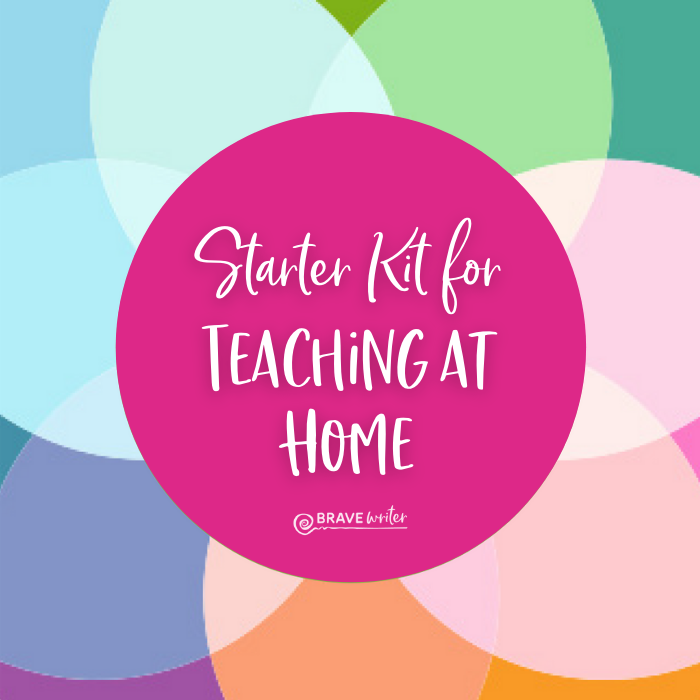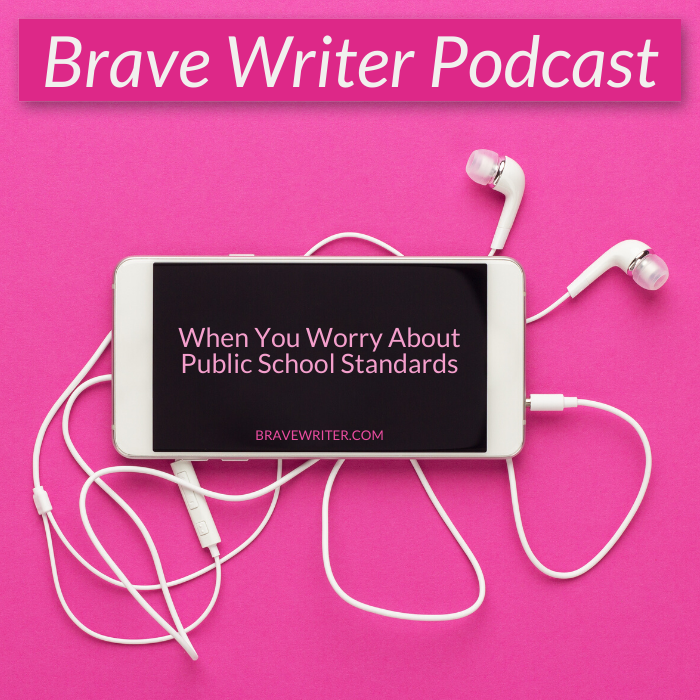
When you signed up for the task of homeschooling, you surely imagined what the ideal homeschooling life would look like. This is the life you are fighting for.
In homeschool, the vision for natural learning is a powerful draw. It’s also worthy of fighting for that vision. But because it is not natural to many of us and we have this controlling memory of traditional school interfering with our new, fragile vision of what homeschool can be, we often wind up fighting about it more than for it.
We’re going to unpack the differences between the two, and how you can focus on fighting for the things you want instead of fighting about them.
Show Notes
I had a question last week that has stuck with me. The homeschool mom told me that she felt overwhelmed by her kids’ constant need for creative ideas. She is running out of them and mostly just wants to settle into that routine that gives the structure and support she needs to homeschool. Meanwhile, her kids resist the routine she has in mind. They wind up arguing about what needs to be done, and how, and by when. Sound familiar?
I thought about the heart of the issue.
I wonder if her real question is this one: What’s worth fighting for? Or maybe it’s this one: What are we fighting about?
It’s a question of emphasis but a super important one. Let’s unpack it in a moment.
What are you fighting about or for?
We fight for what we want. It’s rare that anyone fights without a reason that is compelling to that person. We fight for human rights, sure. But we also fight about how to organize the garage or whether to allow daily time on screens for online gaming.
Fighting is either for or about something of value to the fighter! And frequently that fight is defined by the fighter. In other words, some vision lives in the imagination of a person and they use their fighting skills to try to bring it into being.
How does this fit into homeschool?
When you signed up for the task of homeschooling, you surely imagined what the ideal homeschooling life would look like: Eager kids trotting downstairs to pop open their grammar book, passionate children who are self-motivated to learn, making grade-level progress each year, or a clearly laid out curriculum with no confusion or resistance from your children.
This is the life you are fighting for. In homeschool, the vision for natural learning is a powerful draw. It’s also worthy of fighting for that vision. It’s just that because it is not natural to many of us and the controlling memory of traditional school interferes with our new, fragile vision of what homeschool can be, we often wind up fighting about it more than for it.
Fighting about vs fighting for
When you fight for something, it usually means you have settled on a vision or cause that is worthy of your dedicated energy. The nature of that “thing” is the 20,000-foot view. It’s not necessarily the implementation yet. When we talk, for instance, about how to support the mattering of Black lives, that’s the fight for. We are saying, “I am fighting for equal treatment under the law for all Black lives.” What too often follows, though, is a fight about. We fight about strategies, policies, politics, laws, and so on.
In homeschool we go from fighting for natural learning or brain-based education to fighting about the daily routine.
We get in trouble when we turn the fight for into a fight about.
The warriors in Mulan go from thinking of what it would be like to be in a relationship with a wonderful woman (the fight for a woman) to a fight about what that woman ought to be like. That’s the mistake they make!
A fight for a great homeschool can include:
- A child’s wellbeing
- Scaling the work to the child’s skills
- Providing lots of natural learning resources and opportunities
- Partnering with a struggling learner
- Pressure off, appreciation and support on
- An inviting learning environment
Where it all breaks down is when you and your child have an entirely different idea of what homeschool will look like. When the child is not completing tasks or taking advantage of the routine or is sidetracked by a personal project that doesn’t feel like it’s related to “school,” it’s easy to resort to fighting about what the child is failing to do.
When you are fighting for your vision, you have lots of room for brainstorming, conversations, and trial and error. You’ll be interested in your child’s feedback as part of the process that guides your implementation. You’ll feel brave and curious rather than worried and stressed. You’ll seek alternatives to the only way you know how to do things.
When you are fighting about your vision, you are assuming that the implementation has to look a certain way in order for it to be valid. You’ll find yourself stressed and uptight, careful and irritated.
The vision and the implementation
As you fight for your vision, it’s important to make peace with the idea that the implementation may not match your fantasy. For instance, if one of the visions you are fighting for is your child’s wellbeing, that means when the child is suffering, you are not married to the current practice. If you start fighting about the importance of math and that not everything can be fun, etc., you’ve lost the thread. You’re saying that the “about” is more important than the “for.”
But the other tendency is to give up. It’s like we wanted a child’s wellbeing, but now it’s costing me mine so I am just going to have to use the parental power tool called “my authority” to will you into doing the thing I need you to do despite how you feel about it.
If your vision is a worthy one, though, it’s worth it to put forth that slight bit of extra effort to not give up on it! You can claim for yourself the power of that noble vision. Yes, it may take some work, there may be some bumps and bruises along the way, but ultimately it matters that my child feels good about learning more than completing today’s worksheet.
When you fight about what should or should not be done, at the first sign of distress or distraction, your kids will abandon the requirements. They will see their chance to escape.
In our increasingly polarized world (particularly during election season in the United States), there’s a lot of fighting. Frequently the fighting is about particular policies, practices, laws, leadership behaviors, media coverage, and more.
What is helpful to remember in these fraught times is what each individual is fighting for. Sometimes it helps to scale back the adrenaline rush to ask that question. What vision animates all your passion? Why are you so committed to your struggle? What are you fighting for? When you hear someone’s vision rather than their prescriptions, it’s easier to start a conversation even when you don’t agree.
This fighting for dynamic is one we admire in most cases. Fighting for can have a liberating effect and at least is usually intended to. Fighting about leads to a lot of misunderstanding and anger, judgment, and resistance.
So I give you this final thought:
What are you fighting for? And how has your vision been undermined by falling into the trap of fighting about?
Resources
- Want help getting started with Brave Writer? Head over to bravewriter.com/getting-started
- Sign up for the Brave Writer Newsletter to learn about all of the special offers we’re doing in 2020 + you’ll get a free 7-Day Writing Blitz guide just for signing up: http://go.bravewriter.com/writing-blitz
Connect
- Instagram: instagram.com/juliebravewriter
- Twitter: twitter.com/bravewriter
- Facebook: facebook.com/bravewriter























